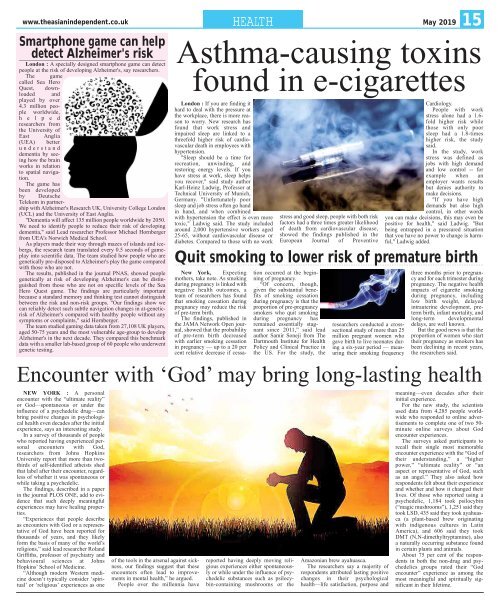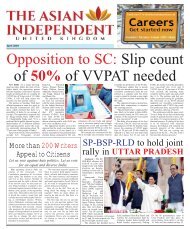You also want an ePaper? Increase the reach of your titles
YUMPU automatically turns print PDFs into web optimized ePapers that Google loves.
www.theasianindependent.co.uk<br />
Smartphone game can help<br />
detect Alzheimer's risk<br />
London : A specially designed smartphone game can detect<br />
people at the risk of developing Alzheimer's, say researchers.<br />
The game<br />
called Sea Hero<br />
Quest, downloaded<br />
and<br />
played by over<br />
4.3 million people<br />
worldwide,<br />
h e l p e d<br />
researchers from<br />
the University of<br />
East Anglia<br />
(UEA) better<br />
understand<br />
dementia by seeing<br />
how the brain<br />
works in relation<br />
to spatial navigation.<br />
The game has<br />
been developed<br />
by Deutsche<br />
Telekom in partnership<br />
with Alzheimer's Research UK, University College London<br />
(UCL) and the University of East Anglia.<br />
"Dementia will affect 135 million people worldwide by 2050.<br />
We need to identify people to reduce their risk of developing<br />
dementia," said Lead researcher Professor Michael Hornberger<br />
from UEA's Norwich Medical School.<br />
As players made their way through mazes of islands and icebergs,<br />
the research team translated every 0.5 seconds of gameplay<br />
into scientific data. The team studied how people who are<br />
genetically pre-disposed to Alzheimer's play the game compared<br />
with those who are not.<br />
The results, published in the journal PNAS, showed people<br />
genetically at risk of developing Alzheimer's can be distinguished<br />
from those who are not on specific levels of the Sea<br />
Hero Quest game. The findings are particularly important<br />
because a standard memory and thinking test cannot distinguish<br />
between the risk and non-risk groups. "Our findings show we<br />
can reliably detect such subtle navigation changes in at-geneticrisk<br />
of Alzheimer's compared with healthy people without any<br />
symptoms or complaints," said Hornberger.<br />
The team studied gaming data taken from 27,108 UK players,<br />
aged 50-75 years and the most vulnerable age-group to develop<br />
Alzheimer's in the next decade. They compared this benchmark<br />
data with a smaller lab-based group of 60 people who underwent<br />
genetic testing.<br />
NEW YORK : A personal<br />
encounter with the “ultimate reality”<br />
or God—spontaneous or under the<br />
influence of a psychedelic drug—can<br />
bring positive changes in psychological<br />
health even decades after the initial<br />
experience, says an interesting study.<br />
In a survey of thousands of people<br />
who reported having experienced personal<br />
encounters with God,<br />
researchers from Johns Hopkins<br />
University report that more than twothirds<br />
of self-identified atheists shed<br />
that label after their encounter, regardless<br />
of whether it was spontaneous or<br />
while taking a psychedelic.<br />
The findings, described in a paper<br />
in the journal PLOS ONE, add to evidence<br />
that such deeply meaningful<br />
experiences may have healing properties.<br />
“Experiences that people describe<br />
as encounters with God or a representative<br />
of God have been reported for<br />
thousands of years, and they likely<br />
form the basis of many of the world’s<br />
religions,” said lead researcher Roland<br />
Griffiths, professor of psychiatry and<br />
behavioural sciences at Johns<br />
Hopkins’ School of Medicine.<br />
“Although modern Western medicine<br />
doesn’t typically consider ‘spiritual’<br />
or ‘religious’ experiences as one<br />
of the tools in the arsenal against sickness,<br />
our findings suggest that these<br />
encounters often lead to improvements<br />
in mental health,” he argued.<br />
People over the millennia have<br />
HEALTH<br />
London : If you are finding it<br />
hard to deal with the pressure at<br />
the workplace, there is more reason<br />
to worry. New research has<br />
found that work stress and<br />
impaired sleep are linked to a<br />
threefold higher risk of cardiovascular<br />
death in employees with<br />
hypertension.<br />
"Sleep should be a time for<br />
recreation, unwinding, and<br />
restoring energy levels. If you<br />
have stress at work, sleep helps<br />
you recover," said study author<br />
Karl-Heinz Ladwig, Professor at<br />
Technical University of Munich,<br />
Germany. "Unfortunately poor<br />
sleep and job stress often go hand<br />
in hand, and when combined<br />
with hypertension the effect is even more<br />
toxic," Ladwig said. The study included<br />
around 2,000 hypertensive workers aged<br />
25-65, without cardiovascular disease or<br />
diabetes. Compared to those with no work<br />
reported having deeply moving religious<br />
experiences either spontaneously<br />
or while under the influence of psychedelic<br />
substances such as psilocybin-containing<br />
mushrooms or the<br />
stress and good sleep, people with both risk<br />
factors had a three times greater likelihood<br />
of death from cardiovascular disease,<br />
showed the findings published in the<br />
European Journal of Preventive<br />
Amazonian brew ayahuasca.<br />
The researchers say a majority of<br />
respondents attributed lasting positive<br />
changes in their psychological<br />
health—life satisfaction, purpose and<br />
<strong>May</strong> <strong>2019</strong><br />
Encounter with ‘God’ may bring long-lasting health<br />
15<br />
Asthma-causing toxins<br />
found in e-cigarettes<br />
New York, Expecting<br />
mothers, take note. As smoking<br />
during pregnancy is linked with<br />
negative health outcomes, a<br />
team of researchers has found<br />
that smoking cessation during<br />
pregnancy may reduce the risk<br />
of pre-term birth.<br />
The findings, published in<br />
the JAMA Network Open journal,<br />
showed that the probability<br />
of pre-term birth decreased<br />
with earlier smoking cessation<br />
in pregnancy — up to a 20 per<br />
cent relative decrease if cessation<br />
occurred at the beginning<br />
of pregnancy.<br />
“Of concern, though,<br />
given the substantial benefits<br />
of smoking cessation<br />
during pregnancy is that the<br />
proportion of pre-pregnancy<br />
smokers who quit smoking<br />
during pregnancy has<br />
remained essentially stagnant<br />
since 2011,” said lead<br />
author Samir Soneji from The<br />
Dartmouth Institute for Health<br />
Policy and Clinical Practice in<br />
the US. For the study, the<br />
researchers conducted a crosssectional<br />
study of more than 25<br />
million pregnant women who<br />
gave birth to live neonates during<br />
a six-year period — measuring<br />
their smoking frequency<br />
Cardiology.<br />
People with work<br />
stress alone had a 1.6-<br />
fold higher risk while<br />
those with only poor<br />
sleep had a 1.8-times<br />
higher risk, the study<br />
said.<br />
In the study, work<br />
stress was defined as<br />
jobs with high demand<br />
and low control -- for<br />
example when an<br />
employer wants results<br />
but denies authority to<br />
make decisions.<br />
"If you have high<br />
demands but also high<br />
control, in other words<br />
you can make decisions, this may even be<br />
positive for health," said Ladwig. "But<br />
being entrapped in a pressured situation<br />
that you have no power to change is harmful,"<br />
Ladwig added.<br />
Quit smoking to lower risk of premature birth<br />
three months prior to pregnancy<br />
and for each trimester during<br />
pregnancy. The negative health<br />
impacts of cigarette smoking<br />
during pregnancy, including<br />
low birth weight, delayed<br />
intrauterine development, preterm<br />
birth, infant mortality, and<br />
long-term developmental<br />
delays, are well known.<br />
But the good news is that the<br />
proportion of women who start<br />
their pregnancy as smokers has<br />
been declining in recent years,<br />
the researchers said.<br />
meaning—even decades after their<br />
initial experience.<br />
For the new study, the scientists<br />
used data from 4,285 people worldwide<br />
who responded to online advertisements<br />
to complete one of two 50-<br />
minute online surveys about God<br />
encounter experiences.<br />
The surveys asked participants to<br />
recall their single most memorable<br />
encounter experience with the “God of<br />
their understanding,” a “higher<br />
power,” “ultimate reality” or “an<br />
aspect or representative of God, such<br />
as an angel.” They also asked how<br />
respondents felt about their experience<br />
and whether and how it changed their<br />
lives. Of those who reported using a<br />
psychedelic, 1,184 took psilocybin<br />
(“magic mushrooms”), 1,251 said they<br />
took LSD, 435 said they took ayahuasca<br />
(a plant-based brew originating<br />
with indigenous cultures in Latin<br />
America), and 606 said they took<br />
DMT (N,N-dimethyltryptamine), also<br />
a naturally occurring substance found<br />
in certain plants and animals.<br />
About 75 per cent of the respondents<br />
in both the non-drug and psychedelics<br />
groups rated their “God<br />
encounter” experience as among the<br />
most meaningful and spiritually significant<br />
in their lifetime.
















